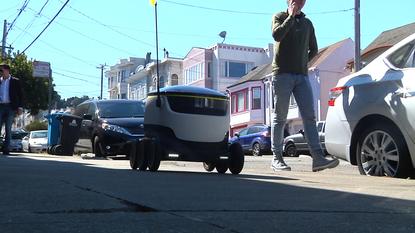Autonomous robots are about to deliver your lunch in D.C. and Silicon Valley
- 20 January, 2017 07:12

When customers in Washington and San Francisco order from two delivery companies, they may not see a human bringing their order to their doors.
It may be a six-wheeled, autonomous robot bringing dinner.
Starship Technologies, the company building a fleet of autonomous delivery robots, has signed deals with meal delivery companies Postmates and DoorDash.
Postmates will use five of Starship’s robots, which are designed to autonomously navigate sidewalks, in the District of Columbia, while DoorDash will use 10 of the machines in Redwood City, Calif., where Starship has its U.S. headquarters.
Postmates is set to begin using the robots next month, while DoorDash is scheduled to begin soon after that.
“Excited to announce our new partnership with DoorDash and Postmates in Redwood City, CA and Washington, D.C!” Starship tweeted Wednesday.
Starship, which was launched in 2014 by Skype co-founders Ahti Heinla and Janus Friis, has been running its delivery robots in London for the past four months.
The devices weighs around 40 pounds and can carry about three filled shopping bags while traveling at a speed of about 4 mph.
Its robots have covered 16,000 miles in the past year, making test runs in 59 cities in 16 countries.
This will be the first time they’ll be operating in D.C. and Silicon Valley, according to a company spokesperson, who also said the cost of a delivery will not increase if it’s made with a robot.
Customers use an app to place an order and can track the robot's progress on a map as it makes the delivery. Meals are locked in the robot, and customers use a button provided on the app to unlock the container and take out their orders.
[Related: The best Japan Robot, gadget and car expo gallery]
At the beginning of the program, a human will accompany each robot as it works its way through a city and finds its destination. The humans will be focused on troubleshooting and answering questions from passers-by.
“Humans will accompany the robot in the medium term,” the spokesperson wrote in an email to Computerworld. “Over time they will work alone.”
While Starship reports no security problems with the robots during the 16,000 miles of test runs, the robots will have cameras, alarms and tracking devices to prevent any problems.
The Starship robots are designed to work in a two to three- mile radius and make deliveries in 15 to 30 minutes.
While the robots work autonomously, human operators monitor them and can take control at any time.

